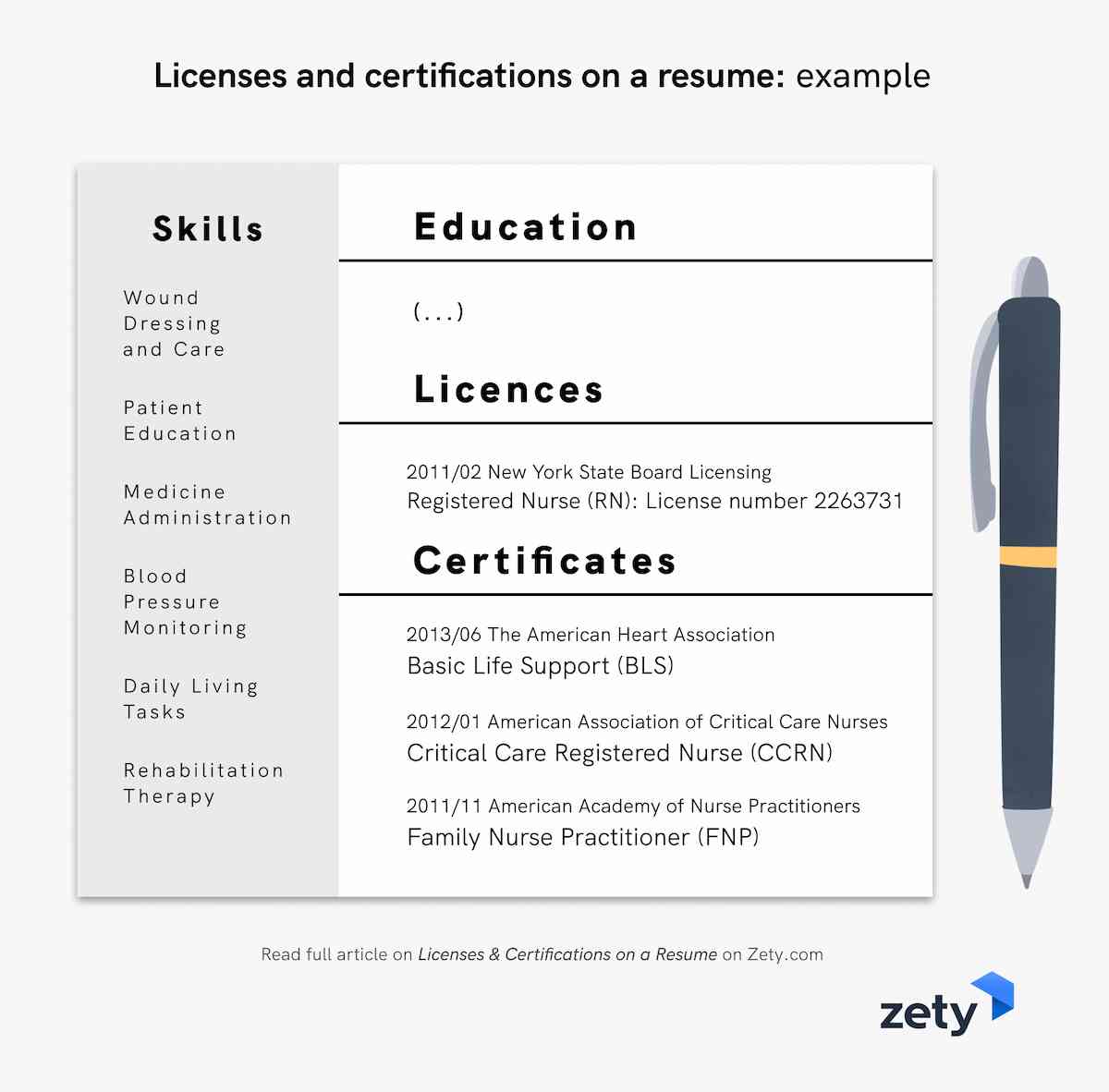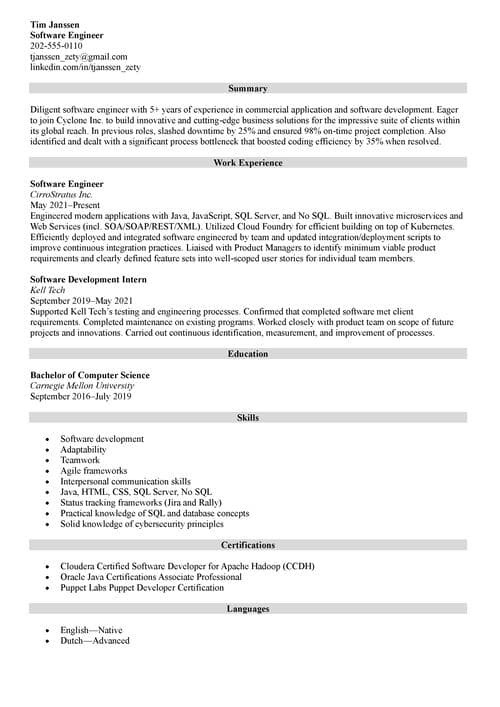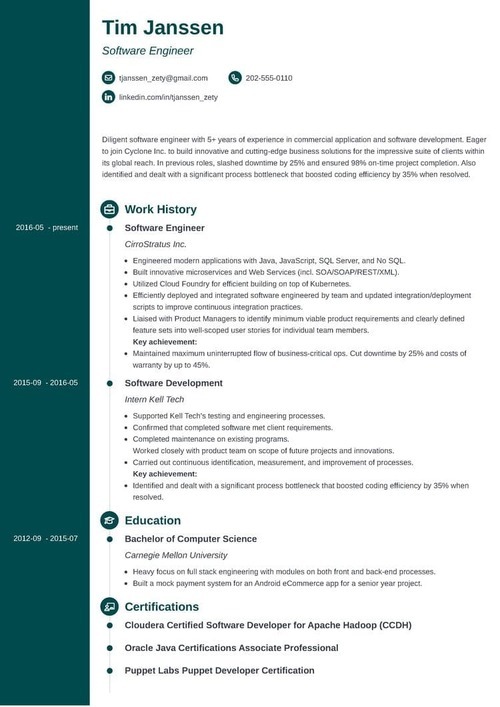How to List Certifications on Your Resume [+ Examples]
Create Your Resume NowCertifications on a resume—do you really need them? The short answer is yes: listing certifications on a resume is the number one way to attract hiring managers. Certifications prove you’re a valuable hire.
But what if you don’t have any? What if your resume certification section is overflowing? How do you even put certifications on a resume?
Well, this article will tell you:
- What are some of the licenses and certifications to put on a resume.
- When and where to put certifications on a resume.
- How to list certifications on a resume the right way.
Want to save time and have your resume ready in 5 minutes? Try our resume builder. It’s fast and easy to use. Plus, you’ll get ready-made content to add with one click. See 20+ resume templates and create your resume here.
Sample resume made with our builder—See more resume examples here.
Looking for more guides on writing the perfect resume? See:
- How to List Education on a Resume
- How to Include Relevant Coursework on a Resume
- How to Put Unfinished Education on a Resume
What Are Certifications?
A certification proves that you have the knowledge and skills to do things. To get that proof, you often must pass a test or course in which you enroll via an accredited institution. These could include organizations like universities or industry associations.
Professional certifications are different from honors and awards. Also, there’s a difference between training and certification. Training results in certification, but not always.
Almost every profession has certifications you can get. Whether you work for McDonald’s or Google, certifications go a long way to prove you’ve got skills and knowledge. Here are some of them:
- Certified ScrumMaster (CSM) administered by the Scrum Alliance is highly recommended for current and aspiring Scrum Leaders working in various industries.
- OSHA Forklift Certification allows you to use these powerful industrial trucks and is appropriate for construction and general industry workers.
- HubSpot Certification, such as i.e., Hubspot Inbound Marketing Certification Course. One of the most prestigious courses in the industry.
- ISSA Personal Trainer Certification, is one of the most popular personal trainer certifications and has been around for over 34 years.
Online Course vs. Online Certification Course
Online courses are like university classes. You can learn everything from psychology to physics. And finishing such classes can earn you credits the same way as at a university. The catch? Online classes don’t always translate to certifications. To get it, you need to ensure the third party issues a certificate upon completion and that it comes with proper authority.
When to Put Certifications On a Resume?
There are certain situations in which you should include your certifications on a resume:
Employer Requires It
Sometimes a job offer lists required certifications to put on a resume. In this case, not adding them can lead to rejection within the initial seven seconds that an average recruiter takes to look at your application.
To Highlight Your Skills & Industry Knowledge
Putting certifications on your resume is an excellent decision to make in today's more and more competitive job market.
According to a data analysis conducted by Workday, a recruiting software brand, these days, business leaders are prioritizing efficiency over growth. This means that they open fewer positions and focus on hiring the best candidates. So, if you include certifications that will show you have industry-related knowledge and some useful skills confirmed by these certifications, you can become the candidate who wins their attention.
To Better Your Chances If You Have Little Professional Experience
If you’re wondering how to make a resume with little to no experience, adding relevant certifications is a way to go. It’s a great way to show your recruiter that you’re ambitious and hard-working!
Did you know that adding hobbies and interests to your resume can help you land a job? Find out how. Read our guide: +20 Best Examples of Hobbies & Interests to Put on a Resume (5 Tips)
When NOT to Put Certifications on a Resume?
Let’s say you’re a certified lifeguard. You’re also CPR certified and ServSafe certified from when you worked at McDonald’s in high school. These are not the easiest certifications to get. Congratulations! But now you’re writing an administrative assistant resume.
Should you put all your other certifications on the resume? No. ServSafe isn’t going to boost that resume.
Include only relevant certifications to the job you're applying for. And add licenses and certifications that you find listed in the job ad.
How to List Certifications on a Resume?
You want your recruiter to know all the necessary details about your certification immediately. That’s why it is crucial not only to include its name, which often can be either confusing, too general, or might just not ring a bell, but you also need to share the following:
How to Format a Certifications Entry on a Resume
- Name of Certification
- Name of Certifying Agency or Body
- Dates of Obtainment (And Expiration Date, If Applicable)
- Location (If Applicable)
| RIGHT |
|---|
| Project Management Professional (PMP) Certification, Project Management Institute, 2013 |
| WRONG |
|---|
| PMP, 2013 |
Pro Tip: Don’t only write “PMP,” but check the job ad. If you see acronyms, then you need to write each acronym at least once. The point? It helps Applicant Tracking System (ATS) software and humans read your resume.
The location is only important if the certification is state-specific. Good examples are teaching and nursing licenses and certifications.
| RIGHT |
|---|
|
| WRONG |
|---|
| Registered Nurse (CO) |
If your certification has an expiration date, you’ll need to add that as well. List only those certificates that haven’t expired yet.
| RIGHT |
|---|
|
| WRONG |
|---|
|
But what if you’re in the middle of getting certified?
How to List In-Progress Certifications on a Resume
List certifications in progress on your resume by adding “in progress” to the description and the anticipated finishing date.
| RIGHT |
|---|
|
| WRONG |
|---|
|
Want to know more about ATS and how to tailor your resume to land your dream job? Read our guide: 6 Tips on How to Tailor Your Resume to a Job Description (Examples)
Making a resume with our builder is incredibly simple. Follow our step-by-step guide, use ready-made content tailored to your job and have a resume ready in minutes.
When you’re done, Zety’s resume builder will score your resume and our ATS resume checker will tell you exactly how to make it better.
Where to Put Certifications on a Resume?
The place where recruiters will find your certifications depends on how important the certification is for your job. You can place them in your contact information section, resume summary or career objective, and education section. Sometimes, however, you can create an additional section on your resume that’s only for your certifications.
List Certifications in the Contact Information Section
Let’s say you’re a registered nurse or a public accountant. You must have certificates and licenses. That means it’s best to put these credentials in your contact information section next to your name.
| RIGHT |
|---|
Alexandra Rothschild, RN Gary Nowak, CPA |
List Certifications in the Resume Summary or Objective
Let’s say you’re a professional with one important certification. That certification is also listed in the job offer as a necessary qualification for the role. In that case, it’s important to draw attention to your certification on your resume immediately. You can do that by adding one line in your resume summary or resume objective.
| RIGHT |
|---|
| Charming Bartender with 5+ years of experience working as a high-end nightclub bartender in major metropolitan areas with a bartending certificate valid in six states. Excellent memory and relationship-building skills resulting in a 10% increase in upselling for all regulars. |
| WRONG |
|---|
| Certified Bartender with 5+ years of experience working in nightclubs. Seeking to leverage skills for a bartending job at the KittyKat Lounge. |
List Certifications in the Education Section
Let’s say you took your certification courses through your university. Or you got certified for your profession after attending high school or college. You only have that one certificate. In that case, you can add your most recent certification to your education section.
| RIGHT |
|---|
Bartending Certification, 2011 New York Bartending School, New York, NY
Bachelor of Arts in English Ohio State University, Columbus, OH 2005–2007 |
| WRONG |
|---|
Ohio State University, Columbus, OH 2005 -2007 Completed 60 credits toward a BA in English New York Bartending School, New York, NY Bartending Certification 2011 |
Always list certifications on a resume in reverse-chronological order. Even if you went to an Ivy League school, put your certification first if it was more recent.
List Certifications in a Separate Certifications & Licenses Section
Sometimes you can’t do the job without the certification. In that case, certifications can go before your education and after your experience. Or simply in a separate certifications & licenses section.

Want to know what else you can put on your resume? Read our guide: What to Put on a Resume to Make It Perfect [Tips & Examples]
Key Takeaway
Remember these points:
- When you’re looking for something extra to spice up your resume, licenses and certifications are the thing. The good news is that there are all kinds of things to get certified in.
- There are some reasons why you should include your certifications on a resume. They can show your skills and knowledge, compensate for your little experience, or simply be required in the job offer.
- The extra good news is that listing great certifications on a resume isn’t hard. You just have to know which job certification programs are best and how to include certifications on a resume.
- The key is getting your professional certifications front and center. That way, hiring managers know right away that you’re a relevant and valuable hire.
About Zety’s Editorial Process
This article has been reviewed by our editorial team to make sure it follows Zety's editorial guidelines. We’re committed to sharing our expertise and giving you trustworthy career advice tailored to your needs. High-quality content is what brings over 40 million readers to our site every year. But we don't stop there. Our team conducts original research to understand the job market better, and we pride ourselves on being quoted by top universities and prime media outlets from around the world.



